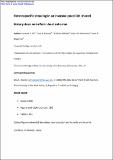Heterospecific shoaling in an invasive poeciliid: shared history does not affect shoal cohesion
Abstract
Social behaviour potentially plays an important role in invasion success. New colonists, for example, may glean useful information about predators and food by interacting with native heterospecifics. The extent to which invaders benefit from such social interactions could hinge on their prior exposure to other species. Here we asked how the shoaling decisions of the Trinidadian guppy, Poecilia reticulata, a successful invasive species, are mediated by their shared history with a heterospecific, the phenotypically similar Micropoecilia picta. To do this, we monitored shoal cohesion in single-species treatments and in treatments where M. picta was present. We predicted that shoal cohesion would be greater in single- than in mixed-species shoals. We also hypothesized that mixed-species shoals consisting of fish with a shared history would be more cohesive than those where the two species had hitherto occurred allopatrically. We found that shoal cohesion did not differ between single- and two-species treatments, or in relation to shared history with M. picta. However, while guppies were more often found in mixed-species than single-species shoals, they were more likely to have a conspecific individual as their nearest neighbour within mixed-species shoals. These results show that guppies willingly shoal with heterospecifics, even in the absence of a shared history, but also that the resulting shoals are not randomly assembled. This flexibility in shoaling may confer a crucial advantage in the initial stages of invasion.
Citation
Ali , J R , Deacon , A E , Mahabir , K , Ramnarine , I W & Magurran , A E 2018 , ' Heterospecific shoaling in an invasive poeciliid: shared history does not affect shoal cohesion ' , Animal Behaviour , vol. 138 , pp. 1-8 . https://doi.org/10.1016/j.anbehav.2018.01.023
Publication
Animal Behaviour
Status
Peer reviewed
ISSN
0003-3472Type
Journal article
Rights
© 2018 The Association for the Study of Animal Behaviour. Published by Elsevier Ltd. This work has been made available online in accordance with the publisher’s policies. This is the author created, accepted version manuscript following peer review and may differ slightly from the final published version. The final published version of this work is available at https://doi.org/10.1016/j.anbehav.2018.01.023
Description
A.E.M. acknowledges funding from the ERC (AdG BioTIME 250189 and PoC BioCHANGE 727440) and the Royal Society.Collections
Items in the St Andrews Research Repository are protected by copyright, with all rights reserved, unless otherwise indicated.

